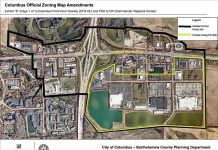City officials will soon begin discussions around regulations for solar farms.
A discussion of zoning ordinance amendments regarding Commercial Solar Energy Systems (CSES) is on the agenda for the Columbus Plan Commission’s meeting this Wednesday, which will be held at 4 p.m. in the council chambers of Columbus City Hall. Community members can also watch the meeting via livestream or participate virtually over Webex.
According to a memo from City/County Planning Director Jeff Bergman, CSES or solar farms are “large-scale facilities that generate electricity for commercial sales.” The classification does not apply to solar panels at individual homes or businesses that primarily provide energy for the property on which they are located.
The Bartholomew County Plan Commission voted in November to approve an ordinance on CSES, deciding 6-1 to approve changes submitted by the county commissioners, which differed from the plan commission’s original recommendations. The full ordinance can be accessed on the City of Columbus-Bartholomew County Planning Department website.
“With the city’s jurisdiction including a sizable agricultural area, it may be prudent for Columbus to also consider the adoption of standards for these large-scale facilities,” Bergman wrote. “Please note that, per the zoning ordinance, these facilities are currently a listed conditional use in the AP (Agriculture: Preferred) zoning district and prohibited elsewhere. As a conditional use, they require case-by-case approval by the Board of Zoning Appeals. However, the city’s zoning regulations currently lack specific minimum setbacks and other development standards for these unique facilities.”
Bergman included a copy of the county’s regulations in his memo to city commission members. CSES are a conditional use in Agriculture: Preferred and Agriculture: General Rural zoning districts.
Setbacks of a solar field must be 200 feet from all non-participating property lines, as well as any nearby schools, churches and residential zoning districts. Additionally, setbacks must be 500 feet from all non-participating residences. No exceptions will be made unless both property owners sign a waiver.
For each proposed solar field development in the county, a public hearing will be held before the Bartholomew County Board of Zoning Appeals before board members take a vote based on a specific set of criteria. Planning officials have said that the provisions of the ordinance are flexible, and the board of zoning appeals has the authority to place conditions on developments.
Throughout the ordinance’s development, county officials heard from a large number of individuals with varying perspectives on how stringent regulations should be.
“I’ve been a (county) commissioner for almost two years, and this is the most contentious issue to come before us,” said Tony London, who also sits on the plan commission, in the fall. “Some say animal control is more contentious, but this issue has resulted in the most feedback.”
The topic of zoning ordinance revisions for solar farms is on the Columbus Plan Commission’s agenda as a discussion item, not an action item. Bergman said in a previous interview that the process of consideration would be as follows:
The city plan commission would have the proposed zoning ordinance changes on its agenda as a discussion item initially.
The commission would vote at a later meeting to send a recommendation to Columbus City Council regarding the changes.
City council members would then vote on whether to approve the changes (with two readings required for approval).





